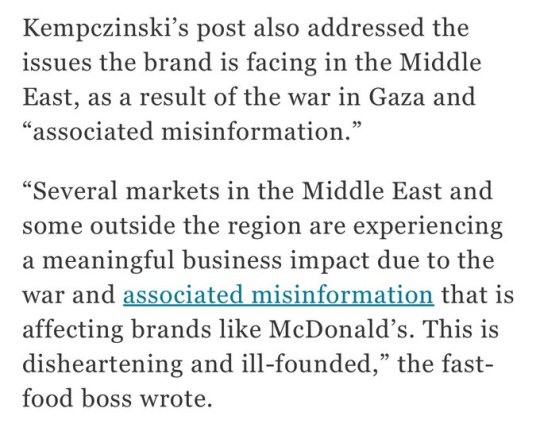#Boycott Divestment and Sanctions
Text
"Israel" are now preparing to gass people in Palestine. The tragic irony of it all.
#genocide#gaza genocide#palestine#israel is a terrorist state#boycott divestment and sanctions#resistance
201 notes
·
View notes
Text
From 2015, mobilising against BDS was stepped up. What was identified by the government as a ‘severe threat’ in 2005, ten years on was generating even more concern. In response, Friends of Israel groups in various countries were encouraged to fight BDS with legal instruments ‘advancing legislation in many countries making boycott illegal’. Between 2014 and 2016, more than 100 measures targeting boycotts and Palestinian rights advocacy had been introduced in state legislatures and congress. Sima Vaknin-Gil, director-general of MSA, reported ‘making progress’ with an $11m budget in 2015, but refused to disclose details: ‘A lot of what we do is under the radar’ she told a Knesset Committee. Nevertheless, as legal materials submitted to the Supreme Court on 7 August 2018 reveal, the Israeli government declared that ‘the Knesset [is permitted] to legislate laws everywhere in the world’ and that it is authorised ‘to violate the sovereignty of foreign countries via legislation that would be applied to events in their territories’. In December 2018, Erdan announced that the MSA would invest $800,000 over the following two years to create an international legal network to fight BDS. By April 2019, 27 US states had adopted such anti-boycott laws and five executive orders against BDS had been issued by state governors.
Antony Lerman, Whatever Happened to Antisemitism?: Redefinition and the Myth of the 'Collective Jew'
50 notes
·
View notes
Text
U.S. Senator Bernie Sanders: "The U.S. gives billions of dollars in aid to Israel. And I think we've got to put some strings attached to that and say you cannot run a racist government. You cannot demean the Palestinian people there and then come to America and ask for money."
115 notes
·
View notes
Text
Nicole Narea at Vox:
Protests against the war in Gaza have spread to college campuses across the country in the days since students at Columbia University were arrested last week, evoking images of historical student protests that were met with similar backlash.
Recent protests have not yet reached the scale of the major student protests of the late 1960s against the Vietnam War or the 1980s against South African apartheid. But on campus, they may be “the largest student movement so far” of the 21st century, said Robert Cohen, a professor of social studies and history at New York University who has studied student activism. In recent decades, there were mass protests against the Iraq War, as part of the Occupy Wall Street movement, and after the killing of George Floyd, but they were primarily happening off campus.
Just like the protesters that came before them, the students who are now being arrested, and in some cases suspended, for setting up encampments on their campuses in solidarity with Palestinians in Gaza have been demonized by politicians. The vast majority are peaceful protesters who have been overshadowed by a minority of bad actors, some potentially not even affiliated with the universities where these demonstrations are taking place.
Some of their demands, including divestiture from firms that support Israel’s war and occupation, mirror demands that past protesters made to divest from South Africa’s apartheid government. And their discontent has similarly intensified in the face of police crackdowns.
But there are key differences as well. Besides their smaller size, the present-day protests have faced swifter suppression than their predecessors dealt with. In perhaps the most extreme example at the University of Texas-Austin, administrators quickly dispatched police with horses and riot gear absent any signs of violence at a pro-Palestinian protest; charges were later dropped against all 57 arrested. And that signals a deterioration of schools’ commitment to protecting free speech that emerged in the 1960s.
“I think that the fact that this has happened so quickly is unprecedented. And the call for suppression of speech is much more public,” Cohen said.
[...]
What today’s protests do and don’t have in common with the antiwar protests of the 1960s
Columbia students famously occupied university buildings in 1968 in protest against segregation and the Vietnam War before the police forcibly removed them. They wanted Columbia to end the construction of a segregated gymnasium nearby in Morningside Park and to cut ties with the Institute for Defense Analyses, which was researching weapons development for the US government’s war effort.
This all happened against a backdrop of broader anti-war and anti-racism protests across the US, both on and off campuses, that helped energize the student movement. Student protests swept college campuses in the 1960s, involving thousands of students and hundreds of universities. Those protests remain the biggest in history; the current protest movement is “clearly growing, but it’s nowhere near that scale,” said Angus Johnston, an adjunct professor at the City University of New York studying student protests.
The tactics employed by protesters in the 1960s were also vastly different. While many started and remained peaceful, at their most extreme, students rioted, barricaded themselves in buildings, fought with police, burned down ROTC buildings, and raided draft boards to steal or destroy files. They culminated in the Kent State massacre in 1970, when members of the Ohio National Guard shot at a crowd of unarmed student protesters, killing four and injuring nine.
The recent protests, on the other hand, have not gone anywhere near as far.
“What we are seeing in this spring’s wave of protest is students who are not engaging in property damage. They are not for the most part occupying buildings. They are certainly not initiating physical altercations on any large-scale level,” Johnston said. “In the late ’60s, what we were seeing was protests that were much more aggressive in their tactics than the ones that we’re seeing today.”
Some students vocally opposed these tactics in the 1960s. Notably, Donald Trump’s former attorney general Bill Barr was among a group of Columbia students, known as the Majority Coalition, who banded together to defend the university buildings from protesters and were incensed that they could not attend class.
Student opposition to today’s protests has highlighted antisemitic incidents at or around some protests, raising concerns about their safety.
For instance, one student at Columbia wrote an op-ed in Haaretz with the headline, “Jewish Students are No Longer Safe at Columbia University.” He wrote that a masked student on campus showed him a Hamas insignia and said he was “with them,” and that another protester near campus shoved him against a wall.
At the same time, Jewish students have also participated in the protests, which have been largely peaceful.
[...]
One way today’s protests resemble those of the 1960s, however, is that they’ve escalated when university administrators have sent in the police to break them up. Both now and then, students who did not participate in the initial or more radical elements of the protests resented being characterized as confrontational and disruptive.
[...]
Today’s protests have a lot in common with anti-apartheid protests of the 1980s
A better analogy for today’s protests might be the anti-apartheid protests of the 1980s.
Students built up their power in university governance and assembled lobbying groups throughout the 1970s. They also became more of a political force when the voting age was lowered from 21 to 18 in 1972. That meant that, by the time protests against South African apartheid gained steam in the 1980s, they had accumulated more political influence and were better organized.
Their demands of university administrations were practically identical to what protesters are asking for today. They wanted their universities to divest from firms that supported or profited from South African apartheid. And they were effective: 155 universities ultimately divested. And in 1986, the US government also bowed to pressure from protesters and enacted a divestment policy.
Along with increasing protests within South Africa led by organizations including the African National Congress, the Pan Africanist Congress, and trade unions, that kind of international pressure helped force the white South African government to begin negotiations that ultimately ended apartheid, at least officially.
But protesters also didn’t face much pushback in the ’80s because there was a “certain embarrassment among elites in the United States that there was complicity with South Africa’s white government,” Farber said.
“It was kind of pushing against an open door,” he said. “It wasn’t really a polarizing issue.”
That differs from today, when the Gaza war has revealed a major generational divide and there doesn’t exist the same kind of consensus among Americans.
The divestment movement against the apartheid government — which started with universities and then was adopted by the US federal government — also arguably packed a bigger punch due to vulnerabilities in South Africa’s economy, including the fact that many of its goods could be substituted with products from elsewhere.
Assuming that divesting from Israel would be possible (and some say it is not), the scholarship on such divestment movements’ effectiveness is mixed.
It would be very difficult to effectively boycott or ban imports of all Israeli goods, many of which do not have substitutes or at least would be hard to replace. That includes computer technology, medical devices, drugs, and advanced machinery in heavy industry. That doesn’t necessarily mean that divestment from Israel would not have a significant impact on public perception of the war in Gaza and the Israeli occupation. But the Boycott, Divestment, and Sanctions (BDS) movement — which predates the current protests — has so far had a negligible economic impact.
Vox analyzes the comparison and differences between the current college campus protests against Israel's genocide campaign targeting Gaza and past protests.
See Also:
The Guardian: US faculty speak up and stand alongside student Gaza protesters
#Ceasefire NOW Protests#Ceasefire#Ceasefire NOW#Gaza#Israel#Gaza Genocide#Freedom Of Speech#Kent State Massacre#Israel/Hamas War#Israel Apartheid#Apartheid#South Africa#Apartheid Era#BDS Movement#Boycott Divestment and Sanctions#Campus Protests
7 notes
·
View notes
Text

«In solidarity with the people of Palestine—who continue to suffer unimaginable violence at the hands of the government of Israel—UDP formally commits to the Palestinian international call for BDS and adheres to the guidelines of PACBI. » – Ugly Duckling Presse, Brooklyn, NY, December 21, 2023
«In solidarity with the people of Palestine—who continue to suffer unimaginable violence at the hands of the government of Israel—UDP formally commits to the Palestinian international call for Boycott, Divestment, and Sanctions (BDS) and adheres to the guidelines of the Palestinian Academic and Cultural of Israel (PACBI).
[…]
We are joining many other poetry and arts organizations, and are grateful to those who have led the way.
We denounce rising Islamophobia in the US. We denounce anti-Semitism. We denounce the false and dangerous conflation of anti-Zionism with anti-Semitism. This is not a boycott of Israeli writers and artists; PACBI and BDS are boycotts of an apartheid state that are modeled off of the historic academic boycott in South Africa.
We believe it is the responsibility of writers, artists, and publishers to imagine new, liberatory futures and we are committed to working with those who uphold this belief.»
#ugly duckling presse#boycott divestment and sanctions#bds#palestinian academic and cultural of israel#pacbi#2020s
6 notes
·
View notes
Text
Palestine solidarity is not a crime
“The espousing of alleged care for Jewish people as the rationale for banning democratic methods of protest shows how willing the Government is to scapegoat Jewish people to serve their own political agenda—especially pronounced given how numerous Jewish groups have opposed the legislation—and to distract from its role in and motivations for curbing our rights, and for its anti-Palestinian policies. It is no coincidence this bill is the fourth in a slew of anti-democratic pieces of legislation, including the Nationality and Borders Act, the Public Order Act and the Police Crime and Sentencing Act, and hot off the heels of the recently announced UK-Israel Bilateral Relations Agreement. That the agreement was signed with an Israeli government that has faced international and domestic condemnation for its descent into far-right extremism shows the unfaltering nature of the relationship.
“That same government has wasted no time also intensifying its oppression and occupation. Since the start of 2023, at least 160 Palestinians have been killed by Israeli forces, including 26 children. The number of incarcerated Palestinians has increased substantially, homes continue to be demolished, and the forcible displacement of Palestinian communities has accelerated. Meanwhile, the Israeli government continues to openly pursue a policy of creeping annexation in the West Bank ...
“Israel knows that despite its flagrant intentions of permanent occupation and apartheid over Palestinians, it will receive unconditional support and protection from the UK government ... More broadly, the silencing of Palestine advocacy remains a significant problem across the UK and Europe. A new report by the European Legal Support Centre documents how pro-Israel advocates instrumentalise antisemitism to this end via both anti-BDS legislation and the IHRA working definition of antisemitism. Lawfare tactics are also being used to target campaigners for Palestinian human rights.
“Of course, these suppression tactics are not limited to Palestine advocacy. Across the pond, anti-BDS legislation has been used in the United States to clamp down on other protest movements. These laws have been used as a template for the introduction of other pieces of legislation banning boycotts of fossil fuel companies and arms companies, amongst others. For example, the American Legislative Exchange Council (ALEC) uses anti-BDS legislation as a model to block boycotts of oil companies in different states. We must therefore also recognise the danger the boycott bill poses to the wider movement for a fairer and more just future for all of us.”
#free palestine#bds bill#boycott divestment and sanctions#bds#palestine#israel#illegal occupation#conservatives#tories#conservative party#right to protest#civil liberties#human rights#authoritarianism#jewish supremacy#far right#fascism#uk#europe#usa
7 notes
·
View notes
Text
London’s biggest screening party for the Eurovision Song Contest finals has been canceled, the venue Rio Cinema and organizer Eurovision Party London have said.
“Following discussion with the organizers of Eurovision Party London, we have collectively decided not to screen the Grand Final of the Eurovision Song Contest this year while Israel remains in the competition,” the Rio Cinema said in a statement on X. “The Eurovision Party London has been a beloved partner of The Rio Cinema for many years, and we will continue to work with them in the future. We firmly believe that the Eurovision Song Contest has the power to bring people together across the world, and when its core values of inclusivity, equality and universality are upheld, it can be a genuine force for good. With its own slogan in mind, we hope that we can all be United By Music again soon. We will continue to organize fundraising events for the charities we support, including Doctors Without Borders and Medical Aid for Palestine.”
#yemen#jerusalem#tel aviv#current events#palestine#free palestine#gaza#free gaza#news on gaza#palestine news#news update#war news#war on gaza#boycott israel#boycott eurovision#boycott divest sanction#bds movement
27K notes
·
View notes
Text
Someone Worte that he could not stand to see the Palestine flag anymore.
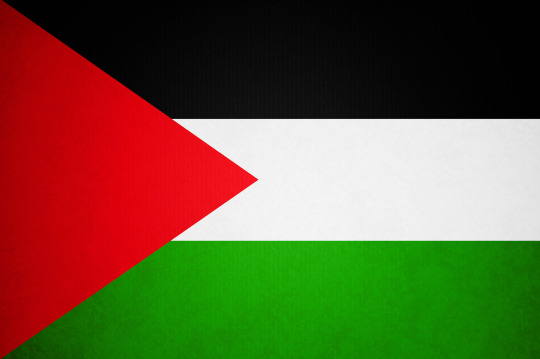
Sorry, but not sorry

Reblog daily

Free Palestine

I am not done yet

Only way to stop seeing this flag is when the oppression is over.
So you are tiered of this? you can end it, stop supporting Zionism!
#free palestine#palestine#free gaza#gaza#genocide#israel is a terrorist state#i stand with palestine#end the genocide#israel#israhell#boycott divestment sanctions#boycott israel#boycott nestle#boycott mcdonalds#boycott starbucks#boycott disney#boycott dell#boycott divest sanction#israel is evil#Israel is bad#boycott#help palestine#palestine forever#pray for palestine#palestine news#news#update#the world stands with palestine
21K notes
·
View notes
Text

While Israel actively commits a genocide and prepares to invade Rafah, Eurovision helps it spread its war propaganda. Boycott Eurovision.
#palestine#free palestine#gaza#free gaza#israel#eurovision#europe#europe news#from the river to the sea palestine will be free#free free palestine#current events#gaza strip#music#jerusalem#boycott israel#boycott#boycott divest sanction#boycott eurovision
29K notes
·
View notes
Text
Tantura 🇵🇸
youtube
22 notes
·
View notes
Text
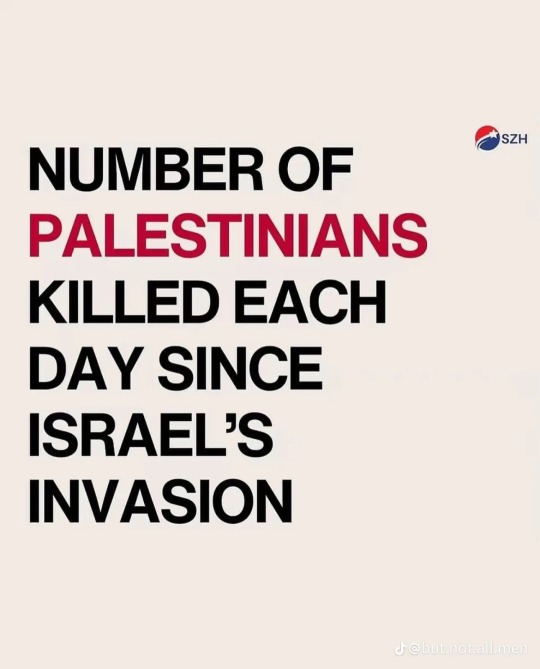

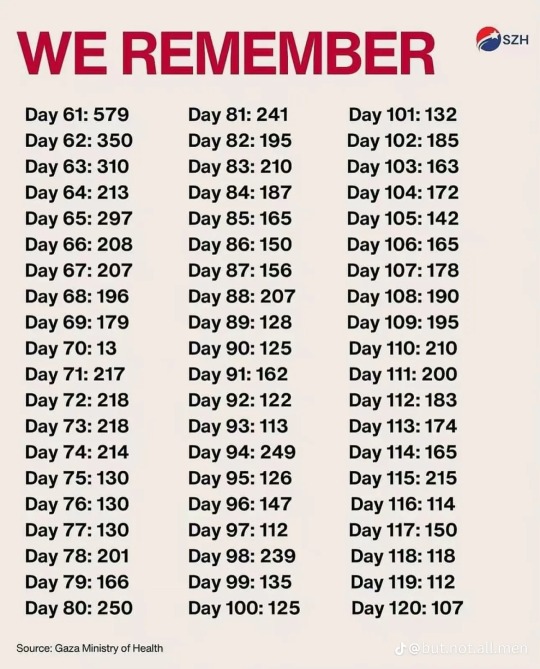

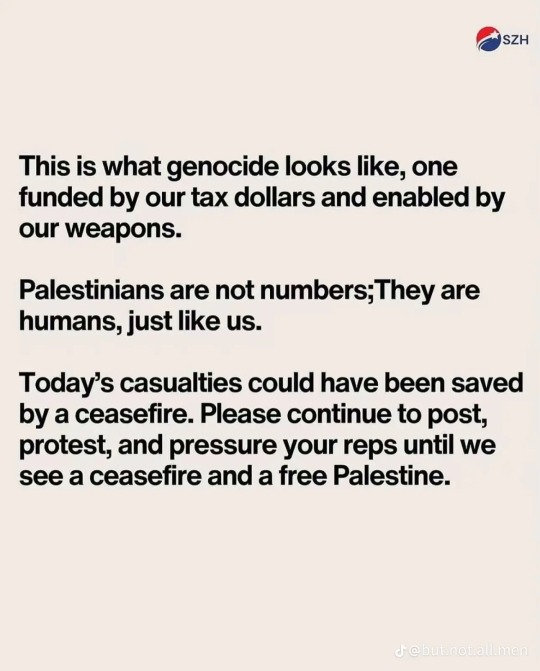
The more you ignore the more we are going to keep pushing.
#free palastine#free gaza#free palestine#freepalastine🇵🇸#palestine#gaza genocide#stand with gaza#war on gaza#gaza strip#gaza#ceasfire now#ceasefire#boycott israel#boycott starbucks#boycott mcdonalds#boycott disney#boycott divest sanction#boycott zara#keep boycotting#support palestine#support gaza#genicide
23K notes
·
View notes
Text

🇵🇸 From BDS - What to Boycott:
Fruits, vegetables and wines from Israel are often wrongly labelled as “Produce in Israel” when they come from stolen Palestinian land. Boycott all produce from Israel in your supermarket and demand they are removed from shelves.
thank you @leandra-winchester for making the graphic above! if any of you are active on other social platforms, you have her permission to use the image however you want (no credit required)
keep in mind, though, that this isn't a complete list: you should still check the origin labels on other types of fruit and veggies, and see if any local orgs have produced a more complete breakdown of israeli produce that's specific to your country
#palestine#israeli#gaza#boycott israel#bds#boycott divest sanction#trying to bring some more awareness to the fruit/veggies part of BDS#since it's the boycott target we're most likely to interact with in our day-to-day lives
28K notes
·
View notes
Text
Nicole Narea at Vox:
A core demand at the heart of the protests over the war in Gaza currently roiling college campuses across the US and around the world: that universities divest from Israel. That means withdrawing funds their endowments have invested in companies that are linked to Israel.
Their demands have revived a long-running debate about whether universities should even consider ethics in their investment decisions and whether there is an ethical approach to divestment from Israel, or if these institutions should simply maximize returns. There is also a question of whether these divestment demands, which have been criticized by some pundits as overly broad, are feasible to meet or will even be effective.
Their demands come as the Palestinian death toll (now over 34,000 people) only keeps rising and as full-blown famine breaks out in northern Gaza, with the rest of the territory remaining at risk.
The US Student Movement for Palestinian Liberation released a statement April 21 indicative of what the protests are broadly calling for; it asked universities to “completely divest our tuition dollars from — and to cut all institutional ties to — the zionist entity as well as all companies complicit in the colonization of Palestine.”
But students on some campuses have articulated more specific demands, seeking to focus their efforts on divesting from major weapons manufacturers that universities have invested in, ensuring that their universities no longer accept research funding from the Israeli military, or ending academic partnerships with Israeli institutions.
Some universities, including Columbia University, have already rejected those calls and have swiftly called the police on protesters, prompting further escalation. Others — including Brown University, Northwestern University, and the University of Minnesota — have agreed to consider them. On Thursday, Evergreen State College became one of the first to approve an effort to divest.
Divestment has been a tactic embraced by protesters in previous student movements opposing the South African apartheid regime and fossil fuel companies contributing to climate change. Those calls for divestment have had varying degrees of success — to what degree depends on how you define that success in terms of their financial or political impact.
[...]
What is divestment?
Divestment is, essentially, reversing an investment. And the goal of divestment movements generally is “generating social and political pressure on the companies that are targets of divestment — stigmatizing behavior,” said Cutler Cleveland, a Boston University sustainability professor who was involved in the decade-long fossil fuel divestment campaign there.
Current calls for divestment from Israel are an outgrowth of the broader Boycott, Divestment, Sanctions (BDS) movement, which originated in 2005 among Palestinian civil society groups after several failures in the two-state peace process and was inspired by the movement to divest from South African apartheid.
The BDS movement’s website argues that, since Israel’s founding in 1948 when it forced 700,000 Palestinians to flee their homes, the country has “denied Palestinians their fundamental rights and has refused to comply with international law” while maintaining a “regime of settler colonialism, apartheid and occupation over the Palestinian people.”
The BDS movement has therefore called on banks, local councils, churches, pension funds, and universities to “withdraw investments from the State of Israel and all Israeli and international companies that sustain Israeli apartheid.”
However, critics of BDS say that it is inherently antisemitic in that it “effectively reject[s] or ignore[s] the Jewish people’s right of self-determination” and that if implemented, it “would result in the eradication of the world’s only Jewish state,” according to the Anti-Defamation League.
Student groups behind the recent protests on college campuses have denounced antisemitism, which they do not equate with opposing Israel. But there have been incidents of antisemitism, and some Jewish students say they feel unsafe on their own campuses as the target of threatening behavior and rhetoric.
[...]
What would make divestment successful?
Calls for divestment at universities have always been a means to a greater end, whether it be bringing down an apartheid regime or reversing climate change.
In the current context, what student protesters really want is an end to the fighting in Gaza, which has killed more than 34,000 Palestinians, and the end of what they see as the injustices Israel, as the biggest cumulative beneficiary of US foreign aid, has exacted on Palestinians for decades. Whether universities ultimately divest and whether that has any material financial impact on Israel might be less important to the protesters than whether their calls for divestment alone can make the status quo politically untenable.
The question is whether the political impact of the protests is lining up with that goal.
Republicans, including former President Donald Trump, have already latched on to the protests as an example of America’s need for their brand of “law and order.”
“The movements themselves become a potent symbol for the other side,” said Matthew Nisbet, a professor of communication, public policy, and urban affairs at Northeastern University.
Both US President Joe Biden and Israeli Prime Minister Benjamin Netanyahu have publicly addressed the protests on US college campuses, suggesting that they are feeling at least some pressure to react — but are not bowing to it yet.
Vox explores the demand of divesting from the Israel Apartheid State, a goal of the student protesters at campuses across the nation.
#BDS Movement#Boycott Divestment and Sanctions#Israel#Israel Apartheid#Campus Protests#Israel/Hamas War#Two State Solution
6 notes
·
View notes
Text
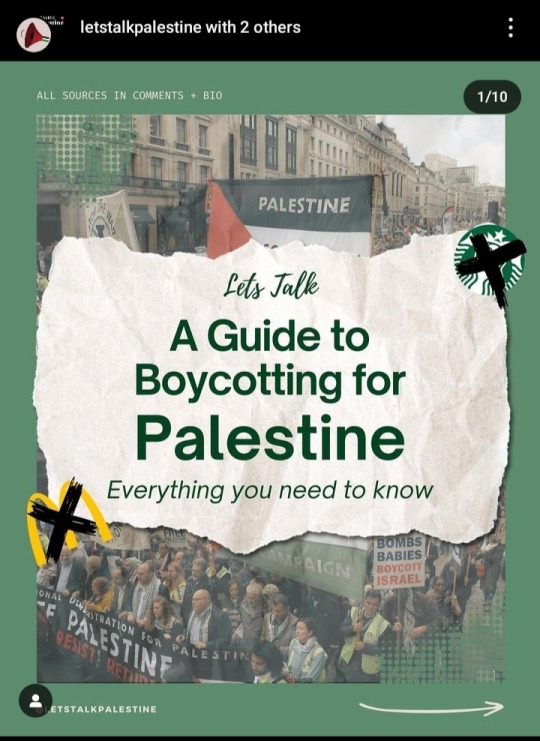
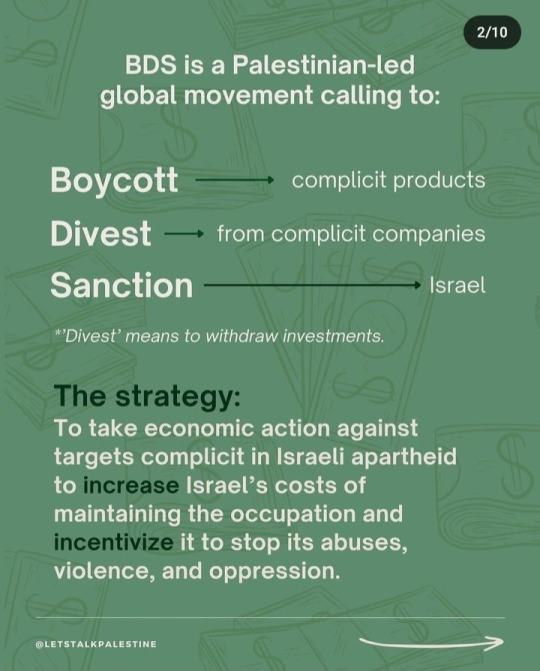
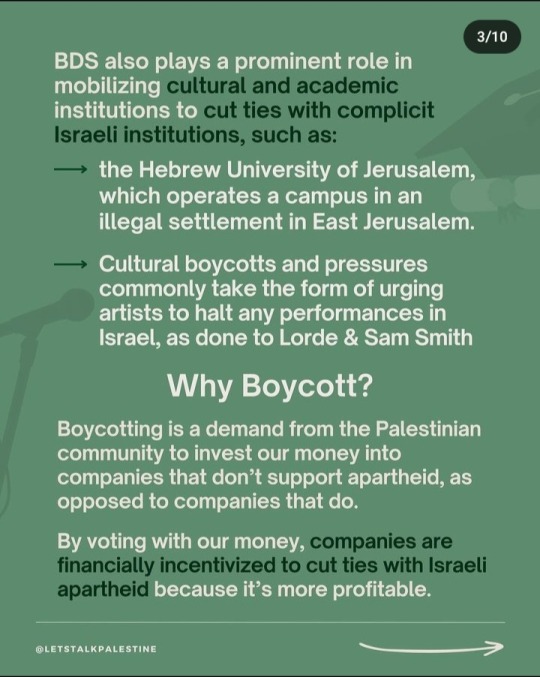

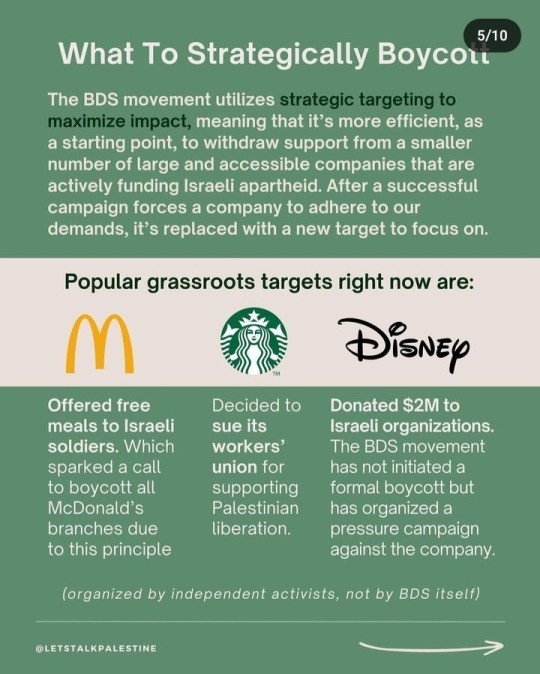

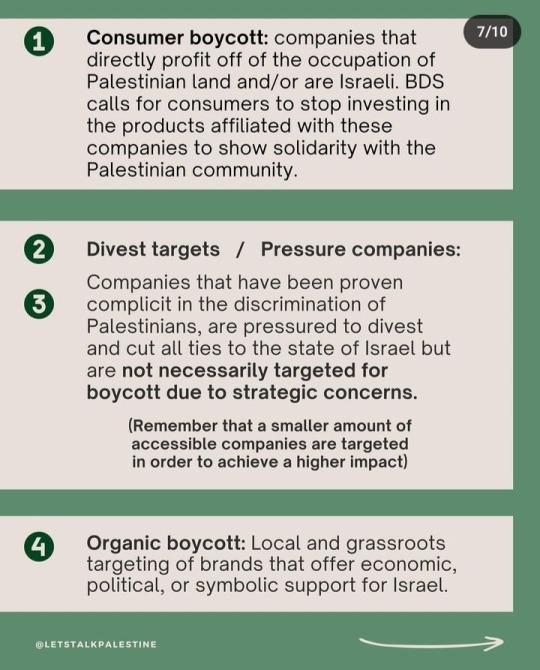
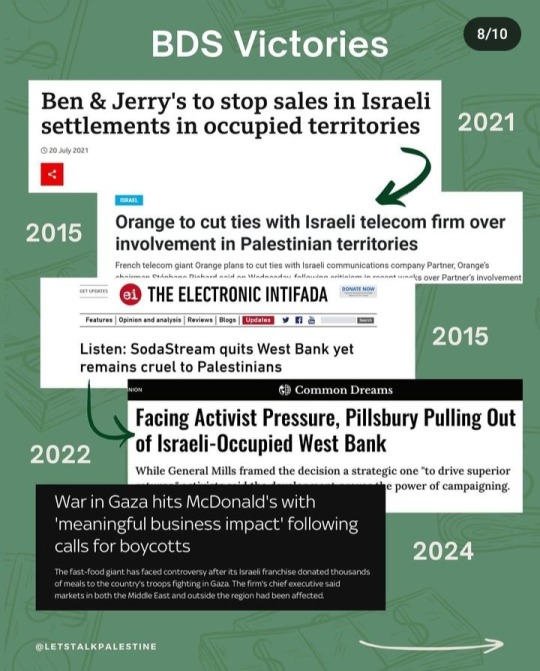
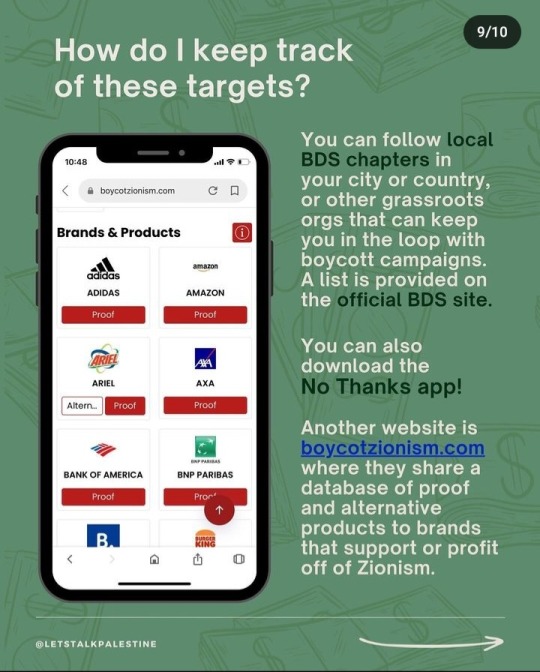
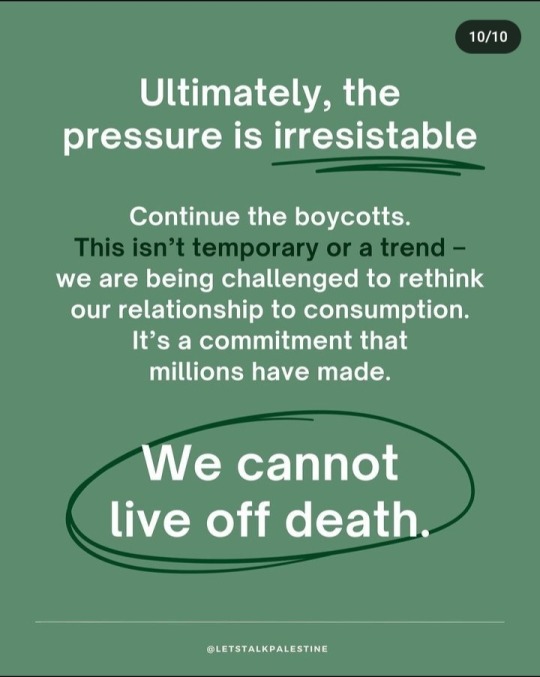
#palestine#free gaza#free palestine#current events#gaza strip#gaza#israel terrorism#israel#important#stop israel#boycott#starbucks#burger king#disney#wish#dominos#bds boycott#bds sanction#boycott divestment sanctions
22K notes
·
View notes


